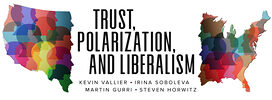The perceptions and observations of this issue take me back in memory a very long time, to when I was a young Cuban kid newly arrived on our shores. Here is what I found most remarkable about my new classmates and friends: they never spoke about politics. It was, to them, an unutterably boring subject. American life at the time revolved almost entirely around the private sphere – family above all, but also church, school, sports, and community organizations like Masonic lodges and chambers of commerce. These institutions held our attention because they were near and real. The federal government, in those far-off days, seemed more of a remote abstraction, like the flag. You pledged your allegiance, then turned to real life.
It is not a paradox to say that the private sphere engendered trust in the system, because at that level the system was composed of friends and neighbors who responded sympathetically to personal triumph or need. But it was much more than that: it was a producer of meaning. The old extended family was the audience for the drama of individual life. Church and synagogue provided stories of exaltation and consolation, as well as moral guidance. Local clubs like Masonic lodges and sports leagues were small ponds in which all who joined could feel like very large frogs.
When national politics came up in the conversation, the subject was addressed by citizens whose sources of personal meaning and dignity were found elsewhere. Tolerance and compromise were possible, because the stakes were small. Today, of course, the opposite is the case: national politics are treated like a life-or-death struggle. As always in human affairs, the causes of this radical alteration are many and complex – allow me to dwell on just two.
The first is the hollowing out of the private sphere. The big extended family is an endangered species; even the immediate family is likely to be broken. Attendance at religious institutions is in precipitous decline. The same is true of membership in lodges, chambers of commerce, and sports leagues. We are proud of our individualism, and we repudiate as obsolete those relations and structures that impinge upon it. But the flip side of that repudiation is a terrible loneliness, a dearth of meaning, and a constant anxiety about personal worth. When we turn our attention to politics, we do so from a posture of existential hunger.
At this moment of weakness, the web came along to tempt us with a vision of all the kingdoms of the world. Any member of the public could be “followed” by millions. Ordinary people could dispute online with presidents and scholars. Here was meaning and community beyond our most distempered dreams. The lure of the web is its massive warping of distance: objects below the horizon appear close at hand. As the door to the highest level of politics seemed to open for all, it was inevitable, I suppose, that so many of us would stream in bearing a heavy burden of private needs and expectations.
But the web is also a mangler of identity. Communities of millions can be entered only at the cost of a severe conformism. At every turn, on every platform, the organic you must be mutilated to join hands with the digital them. The WallStreetBets subreddit that recently roiled the financial markets should have been an investment information site: instead it was a tribe, a war-band, hedged by identity markers and ritual jargon. If you stray from the accepted folkways, you will be cast out. If you attract enough hostile attention, you will be – reputationally, to be sure – burned at the stake. So it has come to pass that the public, gathered in narrow, sectarian digital communities, driven by emotions that were once fulfilled elsewhere, now seeks to play in the great game of politics and demands from participation what politics can’t possibly deliver.
I have often said that the collapse of trust in our political institutions is in large part earned. Democratic government and politics must be reconfigured if they are to adapt to the digital age. But there’s another side to this story. If we place an immense weight of personal expectations on democracy, the system will always fail relative to those expectations, and failure will inspire ever-increasing levels of frustration, anger, and distrust. The last desperate attempt to convert politics into a creed produced the Soviet Union and Nazi Germany. I would hope that no one wishes to head in that direction today.
Liberalism wasn’t structured to grapple with this danger. It’s a purposefully prosaic and procedural business that emerged out of the wars of religion to negotiate peace among multiple paths to salvation. Liberalism is the politics of adulthood: no creed is imposed from above, but individuals are expected to wrestle with their doubts, seeking answers in a society rich in systems of meaning and belief. When society is hollow and political life becomes infantilized, liberalism has little to say.
The need for change thus forks in dramatically different directions. Part of it concerns the reconfiguration of government. That sounds hard but is relatively simple, and may come about organically as a generation born to the web shapes government to its own tastes.
Part of the change is personal and concerns our expectations of politics and our definition of a meaningful life. Individuals must abandon the empty dream that they can “save the earth” and try instead to serve and assist the people in their private sphere, where the human adventure, the endless search for meaning and decency, must necessarily play out. This is a moral question – a matter for the individual will. All each of us require to accomplish change is to do it. That sounds simple, but – as anyone who has tried to lose weight can attest – is extraordinarily hard.

